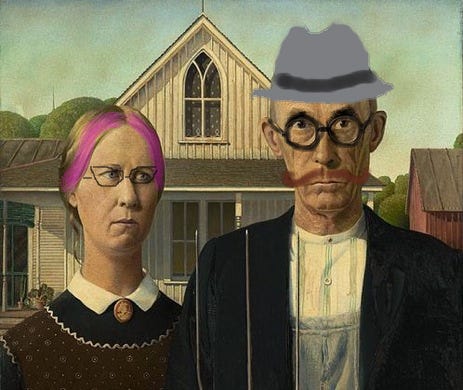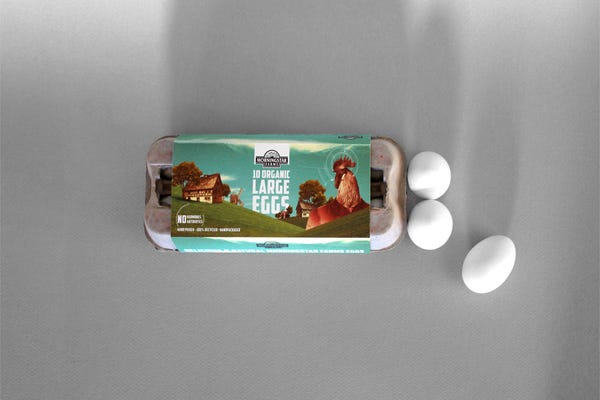Medium: “Silly Hipsters, Farming Sucks” by @GMMeyer https://t.co/haYEapcCuR

Silly Hipsters, Farming Sucks
Hipster farming is silly beyond belief.
I was going to write a post about just how hard Don Draper’s young life was. Life on a farm is really hard, and I wanted to emphasize that, and thought our empathy for Don Draper would make it easy to describe.
But,His life is too complex to discuss purely through the lens of farming. His early life is way too hard and scattered. I was going to junk the whole idea until I read an NBC article, “Backyard chickens dumped at shelters when hipsters can’t cope, critics say.” The content was unsurprising to me. Farming is dirty, hard and tiring.
Sometimes, we pine for that simpler life. People eat a “paleo-diet,” thinking it’ll make them healthier. They grow chickens in their backyard, thinking it’ll make getting eggs easier. I know people who have lived in what they claim was the deep woods, but it’s clear that they didn’t really farm. You can always tell.
All you have to do is feel their hands.
It’s been a long time since America relied on an agrarian economy. We’re so far removed from it that we might expect it to be placid and idyllic.
‘It’s a simpler life, where you can truly be free.’
As Sam Rayburn, the longest serving Speaker of the House, who grew up on a poor East Texas farm, said in his trademark, brusk eloquence,
I plowed and hoed from sun till sun. If some of our city friends who talk about the beauty and romance of farm life would go out and bend their backs over a cotton row for ten or twelve hours per day and grip the plow handles that long, they would see how fast this romance they have read in the novels would leave, and how surely it would come down to a humdrum life of work and toil.
I’m sure if Rayburn shook the hand of someone who thought they could grow their own backyard chicken, he’d chuckle to himself and wonder why their hand was as soft as a woman’s.
We tend to romanticize the past. We look back on times of great hardship, remembering only the bravery of our ancestors. We forget the horrors.
I talked about this with a scholar friend of mine, Jack Bouchard. He studies the life of peasants through history and specializes in the life of the 17th century French peasant. “We tend to preserve the ideal food from the olden days, like onion soup and smoked ham, while forgetting the moldy bread and barley soaked in cod water.”
We engage in this selective editing because we must. We’d almost certainly go mad if we didn’t.
And so the past looks a little rosier. We choose not to remember the 50lb iron irons one must heat on a hot stove all day when one doesn’t have electricity. In the hill country of West Texas they called them “sad irons.” We forget the 100lbs of water one has to lug to the house from the field — where else would the water pump be — once a week to wash clothes.
It’s no wonder such a life of hardship produced women who would, in a Monty Python sketch, be called old crones. To romanticize such a life is to trivialize all of our ancestors.
We tend to preserve the ideal food from the olden days, like onion soup and smoked ham, while forgetting the moldy bread and barley soaked in cod water.
Farm life is easier today, for those who can and choose to afford it. The means of mass production has removed the work that used to cause the skin on one’s hands to crack and blister, and one’s back to develop a painful stoop.
The ignorance of these kids caused them to opt out of this modern farming and try to grow chickens on their own. Mostly, it seems that they have just mistaken the packaging on today’s foods for what farming used to be, taking issue with modern factory farming.

I shudder to think what would happen to those who are more radical. The kids in this article are only half cocked; they’re just raising their own chickens, maybe a few vegetables in their backyard.
What will happen to those who try to go out and farm on their own, purely for themselves?
What will happen when their crops fail? This isn’t a question of if. All farmers crops fail sometimes. It’s why the US Federal Government provides crop insurance for most farmers. (While most economists hate farm subsidies, they usually casually forget to mention subsidized crop insurance among them — they know it’s incontestably necessary.)
Everyone will have a bad year, even using the best farming techniques. (I doubt these kids will use the best farming techniques, finding the modern ones to be extremely distasteful for some reason or another.)
When you’re practicing subsistence farming and your crops fail, you’re fucked. No one who really knows that life would ever willingly choose it.
For all of it’s faults, modern society has offered us a lot. It has relieved us from lives of unrewarded toil. I get frustrated when people, who clearly have no inkling of what they’re talking about, denigrate it. Sure, modern society isn’t perfect. Nothing is. But we can make it better, slowly building it into that shining city on the hill. There is no reason to reject it whole cloth, especially when you know what that would entail:
The pre-modern peasant farmer was not in touch with his land, was not eating good whole-grain bread and fresh organic chicken meat. He was eating rough, week-old bread (or more likely porridge) and salted meat, praying for rain that might not come, breaking his back at the plow, worrying about every harvest, taking out loans in rough times and forcing his children to help him farm. Any slight problem would mean that he was unable to provide his family with the necessary nutrients for a healthy life, and would watch them grow sick and die. So yeah, in light of that, I’d probably rather kill myself than be traditional farmer.
-Jack Bouchard
